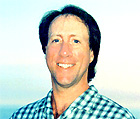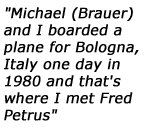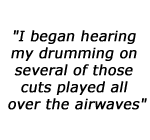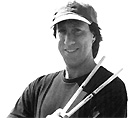Home
 Interviews
Interviews
 Terry
Silverlight
Terry
Silverlight
An
interview with Terry Silverlight
By
Patrik Andersson
A
perfect 10 drummer
What
education do you have?
Princeton
University.
Was
the choice of drums a natural decision or did you play any
other instruments?
My
first love was drums, but I studied piano formally all along
as I grew up. Although I will not perform on piano, I have
enough technical facility to accommodate the extensive work
I do as a composer/producer/arranger.
What
was the name of the first group that you played in?
 The
first band I was in was led by my brother Barry Miles which
was later called "Barry Miles And Silverlight". I was 14 years
old when I played drums on my first recording in 1971, which
was my brother Barry Miles's "White Heat". It was one of fusion
music's earliest efforts, before there even was a category
named "fusion", a style of music primarily invented and developed
by Barry Miles. The musicians on that record were unknowns
discovered by Barry Miles who later became well-known in the
jazz world such as Pat Martino, John Abercrombie, Lew Tabackin,
Warren Smith and Victor Gaskin. The album became a cult favorite
listened to by Pat Metheny and other musicians who were students
at the time, but later became famous in their own right.
The
first band I was in was led by my brother Barry Miles which
was later called "Barry Miles And Silverlight". I was 14 years
old when I played drums on my first recording in 1971, which
was my brother Barry Miles's "White Heat". It was one of fusion
music's earliest efforts, before there even was a category
named "fusion", a style of music primarily invented and developed
by Barry Miles. The musicians on that record were unknowns
discovered by Barry Miles who later became well-known in the
jazz world such as Pat Martino, John Abercrombie, Lew Tabackin,
Warren Smith and Victor Gaskin. The album became a cult favorite
listened to by Pat Metheny and other musicians who were students
at the time, but later became famous in their own right.
In
81 you played drums on BB & Q bands debut album. Tell us about
how you met Petrus Little Macho stable?
Michael
Brauer, who was the engineer for those albums recruited me
for the recordings. I have another brother, Ron, who had his
own band called "Silverhoof" in which Michael was the drummer.
Michael was a fan of mine in those days as he heard me play
with "Barry Miles and Silverlight" live and on recordings.
When Michael saw that the Little Macho people were looking
for a drummer, Michael took the opportunity and called me.
Were
you and the other musicians hired just for the recording of
the albums, were the songs and the lyrics always finished
when you were to play you part and how did the recording procedure
go?
 I
was hired just for the recording with no mention of any live
work. Michael and I boarded a plane for Bologna, Italy one
day in 1980 and that's where I met Fred Petrus, Mauro Malavasi
who was the leader of the sessions in the sense that he made
all the musical decisions and had the overall musical vision
as to what all the rhythm section players should be playing,
including myself. Davida Romani, the bass player who was living
in Bologna contributed a lot of his ideas too and he and Mauro
were in constant communication. Neither Mauro or Davida spoke
hardly any English, so most of their communication with me
was in body language and verbal guessing games. But, having
had prior studio experience and due to my flexible and intuitive
nature, we all got along instantly and understood each other
clearly most of the time. Michael was very helpful with the
tuning of the drums and his snare, bass drum and tom sounds
were awesome. The combination of the sound of my drums (I
flew my own drums over for these sessions) and the way I played,
paved the way for future hit R&B records in that genre. In
fact, a year later Luther Vandross called me at the apartment
I was living in at the time in NYC and asked me to play drums
on his very first solo artist tour. He said he had heard my
playing on the "Miracles" Change record as well as the first
BBQ record and that it was the best drumming he had heard
to date in that style. Luther was an unknown at that time,
and I was right in the middle of recording an album with the
great Laura Nyro, so unfortunately I had to pass up the tour.
Back to the recording, I think all the songs might have been
finished but I never heard any of the melodies or anyone singing,
only myself, bass, a pre-existing synthesizer part on tape,
Onaje Allan Gumbs on Rhodes, and Doc Powell on guitar. Onaje
and Doc flew over separately. Unfortunately, Onaje was fired
and sent home after a few days.
I
was hired just for the recording with no mention of any live
work. Michael and I boarded a plane for Bologna, Italy one
day in 1980 and that's where I met Fred Petrus, Mauro Malavasi
who was the leader of the sessions in the sense that he made
all the musical decisions and had the overall musical vision
as to what all the rhythm section players should be playing,
including myself. Davida Romani, the bass player who was living
in Bologna contributed a lot of his ideas too and he and Mauro
were in constant communication. Neither Mauro or Davida spoke
hardly any English, so most of their communication with me
was in body language and verbal guessing games. But, having
had prior studio experience and due to my flexible and intuitive
nature, we all got along instantly and understood each other
clearly most of the time. Michael was very helpful with the
tuning of the drums and his snare, bass drum and tom sounds
were awesome. The combination of the sound of my drums (I
flew my own drums over for these sessions) and the way I played,
paved the way for future hit R&B records in that genre. In
fact, a year later Luther Vandross called me at the apartment
I was living in at the time in NYC and asked me to play drums
on his very first solo artist tour. He said he had heard my
playing on the "Miracles" Change record as well as the first
BBQ record and that it was the best drumming he had heard
to date in that style. Luther was an unknown at that time,
and I was right in the middle of recording an album with the
great Laura Nyro, so unfortunately I had to pass up the tour.
Back to the recording, I think all the songs might have been
finished but I never heard any of the melodies or anyone singing,
only myself, bass, a pre-existing synthesizer part on tape,
Onaje Allan Gumbs on Rhodes, and Doc Powell on guitar. Onaje
and Doc flew over separately. Unfortunately, Onaje was fired
and sent home after a few days.  It
was weird. He played great, but as far as I could tell, the
reasoning behind his dismissal was that Mauro could play all
those repetitive parts himself and didn't need anyone else's
input as far as creating the parts, so why not play them himself
and save Fred the money of hiring an extra musician. So, basically
Mauro would say, "OK, here's a new song and the tempo is this
and let's try some different drum grooves. The small rhythm
section would play the groove, try several options, learn
where the breaks and changes were in the song form, and then
cut the song in one or two complete takes. Not much punching
in. What you hear on those records, at least as far as the
drums goes are live, complete takes. Davida punched in his
bass parts relentlessly after my drums were recorded. I say
relentless in a complimentary way. The parts Davide created
by being so meticulous made for some of the most inventive
bass lines in recorded history. This procedure went on for
a full two weeks, one track after another. I had no idea the
name of the project, the label or anything. About 6 months
later back in NY, I began to hear rumors that there were vocal
auditions being held at Media Sound Studios where every great
singer in New York and elsewhere were showing up. It turned
out the Mauro and Fred were auditioning singers to sing over
the tracks I had played on in Italy. A few months after that,
I was informed that those dates were released on three separate
recordings, a Change record on Atlantic, a BBQ Band album
and third one that I don't recall now. Before I knew it, I
began hearing my drumming on several of those cuts played
all over the airwaves.
It
was weird. He played great, but as far as I could tell, the
reasoning behind his dismissal was that Mauro could play all
those repetitive parts himself and didn't need anyone else's
input as far as creating the parts, so why not play them himself
and save Fred the money of hiring an extra musician. So, basically
Mauro would say, "OK, here's a new song and the tempo is this
and let's try some different drum grooves. The small rhythm
section would play the groove, try several options, learn
where the breaks and changes were in the song form, and then
cut the song in one or two complete takes. Not much punching
in. What you hear on those records, at least as far as the
drums goes are live, complete takes. Davida punched in his
bass parts relentlessly after my drums were recorded. I say
relentless in a complimentary way. The parts Davide created
by being so meticulous made for some of the most inventive
bass lines in recorded history. This procedure went on for
a full two weeks, one track after another. I had no idea the
name of the project, the label or anything. About 6 months
later back in NY, I began to hear rumors that there were vocal
auditions being held at Media Sound Studios where every great
singer in New York and elsewhere were showing up. It turned
out the Mauro and Fred were auditioning singers to sing over
the tracks I had played on in Italy. A few months after that,
I was informed that those dates were released on three separate
recordings, a Change record on Atlantic, a BBQ Band album
and third one that I don't recall now. Before I knew it, I
began hearing my drumming on several of those cuts played
all over the airwaves.
How
did you experience your time with the musicians in the studio,
how was the working climate?
See
above for that description. The only thing I can add is that
there was plenty of great food all the time. We stopped each
day for fabulous lunches and were treated to great dinners
at beautiful restaurants. I got along with everyone and there
were never stressful moments. Intense, but not stressful.
On
the record with BB it says that Petrus was both producer and
executive producer. What was the real difference in this stable
when it comes to these matters? For sure Malavasi and Romani
were the masters behind the music but did Petrus actually
participated in the studio work and what was your experience
about his way of working?
In
brief, I think Fred was the business guy. He didn't seem to
be hands-on musically, although he was certainly aware of
the overall direction and obviously was one of the creators
of the overall vision. But, he left all the technical aspects
and particulars of the actual music making to Mauro, with
assistance from Davida and a few other friends in the control
room (like Rudy the saxophonist).
You
continued to play drums on Change's album in 82 but then you
vanished from there, why? What did you do the years after,
until 85?
 Periodically,
I was called in to play on dates for Fred Petrus. Fred would
call me at home and ask if I was available on such and such
a date to come into Media Sound and play on a few songs for
one of his new projects. I played on more Change songs, plus
some tracks on a great album called "Zinc" and others. I was
also asked by Mauro to fly back to Italy and record an album
he produced for the artist "Ron" which was more of a pop effort
that became a big hit over there. Fred was interested in using
a variety of musicians at that time, so I was one of maybe
three drummers that he rotated around with. I was the only
white guy in the loop for the most part, so perhaps he wanted
to be sure there was some blackness in there for political
reasons. I don't know. All I know is that he loved the way
I played, I made some hits for them and I kept in touch with
him until he passed away. After that second Change album,
Fred basically stopped using freelance studio musicians such
as myself and started focusing on making Change a touring
band with those guys also playing on the recordings. I was
never asked to be a part of that, probably because my reputation
was becoming solidified as a studio musician who didn't want
to travel unless the money was outstanding, which this definitely
wasn't. Fred saw me and respected me in this light and that's
most likely what happened. However, he did occasionally call
me for sessions anyway thereafter. I continued my work as
a studio drummer and ended up playing on dozens of hit records
for Billy Ocean, Tom Jones, George Benson, Freddie Jackson,
Stephanie Mills, Melba Moore, lots of jazz associations plus
many jingles and film work. I also continued my interest in
songwriting/production and had several things recorded during
that time. Please visit my Web Site at "www.terrysilverlight.com"
for a full list.
Periodically,
I was called in to play on dates for Fred Petrus. Fred would
call me at home and ask if I was available on such and such
a date to come into Media Sound and play on a few songs for
one of his new projects. I played on more Change songs, plus
some tracks on a great album called "Zinc" and others. I was
also asked by Mauro to fly back to Italy and record an album
he produced for the artist "Ron" which was more of a pop effort
that became a big hit over there. Fred was interested in using
a variety of musicians at that time, so I was one of maybe
three drummers that he rotated around with. I was the only
white guy in the loop for the most part, so perhaps he wanted
to be sure there was some blackness in there for political
reasons. I don't know. All I know is that he loved the way
I played, I made some hits for them and I kept in touch with
him until he passed away. After that second Change album,
Fred basically stopped using freelance studio musicians such
as myself and started focusing on making Change a touring
band with those guys also playing on the recordings. I was
never asked to be a part of that, probably because my reputation
was becoming solidified as a studio musician who didn't want
to travel unless the money was outstanding, which this definitely
wasn't. Fred saw me and respected me in this light and that's
most likely what happened. However, he did occasionally call
me for sessions anyway thereafter. I continued my work as
a studio drummer and ended up playing on dozens of hit records
for Billy Ocean, Tom Jones, George Benson, Freddie Jackson,
Stephanie Mills, Melba Moore, lots of jazz associations plus
many jingles and film work. I also continued my interest in
songwriting/production and had several things recorded during
that time. Please visit my Web Site at "www.terrysilverlight.com"
for a full list.
Your
personal thoughts about BB & Q band's and Change's music?
My
experience in Italy was unforgettable and exhilarating. I
loved the pretty chord changes, the openness of the production,
the pads Mauro used on the synthesizer, the funky bass stuff
Davida played and the memorable guitar patterns Mauro coached
Doc Powell to play. I thought the music swung and I really
liked the vocals when I finally heard them. It was awesome.
Your
thoughts about Petrus?
I
really liked Fred very much. He was always very kind to me
and had a soft way about him that made me feel comfortable.
He was quiet and careful about what he said and when he said
it and never came off as being aggressive. I liked him.
As no picture of him is available of Petrus, can you tell
me about his looks?
I
have heard brief quotes about Fred from other people, but
I only know him the way I remember him and the way he treated
me which was kindly and fairly. Fred was a pretty big guy
with a roundish head and not much hair, probably fully shaven
or bald. He wasn't fat, but he was big. You wouldn't want
to mess with him. If you didn't know him, he could be intimidating
at first meeting.
In
85 you were one part on Freddie Jackson's marvelous debut
LP? How did you get that gig and in what way did this record
different from the most recent years before musically?
Barry
Eastmond, who produced that record, hired me to play on it.
Barry was the piano played in my own band back in 1978. He
was still living at home with his parents while going to Brooklyn
College and touring with Melba Moore, Phylis Hyman and others
as a pianist. I got him one of his first sessions as a pianist
on one of Fred Petrus' projects, probably Change. That was
an important session for Barry in that he used it as a strong
credit when getting his own production work. Barry quickly
worked his way to the top and at the first opportunity, recommended
I play drums on Billy Ocean's "Suddenly". From there, Barry
called me for all of his dates.
How
have you musical life been since 85 until today?
Please
visit my Web Site at "www.terrysilverlight.com",
but in brief I've continued to play on countless recordings,
I was in Roberta Flack's band for 3 years, and I've been very
active as a composer having written many jingles, songs for
artists and a myriad of film composing.
Compare
the musical industry now and then?
That's
hard to say. Many musicians complain they don't work as much
any more in the studios, but the decision I made back in the
Change days not to commit to any one band or project has resulted
in my being known in various circles, so I get called constantly
for work. It is true that drum programming has taken away
so much work from drummers. But now that people are going
back to the old recordings where people like me played live
drums and realize how irreplaceable that actually is, live
recording is beginning to come back again at least in part.
How
do you look up on today's black R&B music?
I
think it's still one of the most exciting forms of music in
that the songwriting and production elements are still groundbreaking
and creative. It's built upon all that's come before (which
I am proud to have been a part of developing from the rhythm
side of things) and is still developing.
What
is your point of view on music today on a whole? Are you open
minded for new waves and constellations? Can the music really
find new and fresh melodies in a time when everything seems
to be taken and used?
I
have no doubt that there is room for endless possibilities
if only the people who actually run the industry, who unfortunately
in majority aren't musicians at all, would stay out of things
and let the talents of the musicians dictate the course.
By
PATRIK ANDERSSON 2002
A
great thanks to Terry for his open minded attitude and informative
answers!
Interviewed
on PSFS in August 2002 by Patrik B. Andersson. The interview
has been edited. All rights reserved